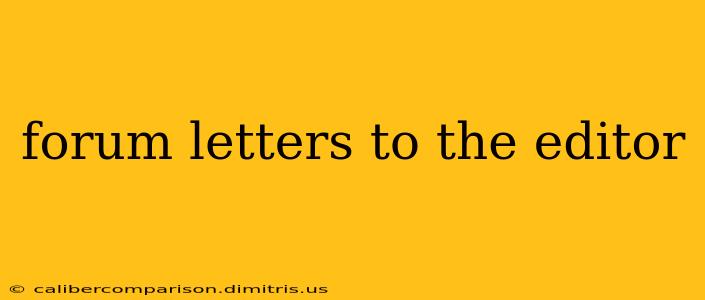Submitting a letter to the editor of a forum, newspaper, or online publication is a powerful way to share your perspective, engage in public discourse, and influence opinion. However, crafting a compelling letter that gets published requires more than just strong opinions; it demands a strategic approach. This guide will walk you through the process of writing effective forum letters to the editor, ensuring your voice is heard and your message resonates.
Understanding the Purpose and Audience
Before you start writing, consider the following:
- Your Goal: What do you want to achieve with your letter? Are you aiming to correct misinformation, propose a solution, express support or opposition, or spark debate? A clear objective will guide your writing.
- Target Audience: Who are you writing for? Understanding the publication's readership and their typical viewpoints will help you tailor your language and arguments accordingly. A letter to a local newspaper will differ significantly from one submitted to a national publication.
- The Publication's Style Guide: Many publications have specific guidelines for letter submissions, including word limits, formatting requirements, and preferred tone. Review these guidelines carefully before submitting.
Crafting a Compelling Letter
Here's a step-by-step guide to writing a persuasive letter:
1. The Hook: Grab the Reader's Attention
Your opening sentence is crucial. It needs to immediately capture the reader's interest and clearly state the topic of your letter. Avoid vague or rambling introductions. Consider starting with:
- A strong statement: "The recent decision to…"
- A relevant anecdote: "Last week, I witnessed…"
- A compelling question: "How can we allow…"
2. Context and Background: Setting the Stage
Briefly provide necessary background information to ensure readers understand the issue you're addressing. Refer to specific articles, events, or policies to establish context. Avoid lengthy explanations; focus on the most relevant details.
3. Your Argument: Presenting Your Case
This is the heart of your letter. Clearly and concisely state your opinion and support it with logical arguments, evidence, and examples. Avoid emotional language or personal attacks; focus on facts and reasoned analysis. Structure your arguments logically, presenting one point at a time.
4. Counterarguments and Rebuttals (Optional): Addressing Opposing Views
Addressing potential counterarguments demonstrates a comprehensive understanding of the issue and strengthens your credibility. Acknowledge opposing viewpoints, but respectfully refute them with evidence and logic.
5. Call to Action (Optional): Suggesting Next Steps
Depending on your goal, you may want to include a call to action. This could be a suggestion for a specific policy change, a recommendation for further research, or an invitation for dialogue.
6. Conclusion: Summarizing Your Key Points
Reiterate your main points concisely and leave a lasting impression. Avoid introducing new arguments in the conclusion.
7. Proofreading and Editing: Ensuring Clarity and Accuracy
Before submitting, meticulously proofread your letter for grammatical errors, spelling mistakes, and clarity. A well-written letter reflects positively on your credibility.
Tips for Success
- Keep it concise: Most publications have word limits; adhere to them strictly.
- Be respectful: Even when disagreeing, maintain a respectful and professional tone.
- Cite your sources: Support your claims with evidence and cite your sources appropriately.
- Use strong verbs and active voice: This makes your writing more engaging and impactful.
- Personalize your letter: Share your personal experiences or observations to make your argument more relatable.
- Read other letters: Familiarize yourself with the publication's style and the types of letters they typically publish.
By following these guidelines, you can significantly increase the chances of your forum letter to the editor being published and making a meaningful contribution to the public conversation. Remember, your voice matters, and a well-crafted letter is a powerful tool for expressing your views effectively.

